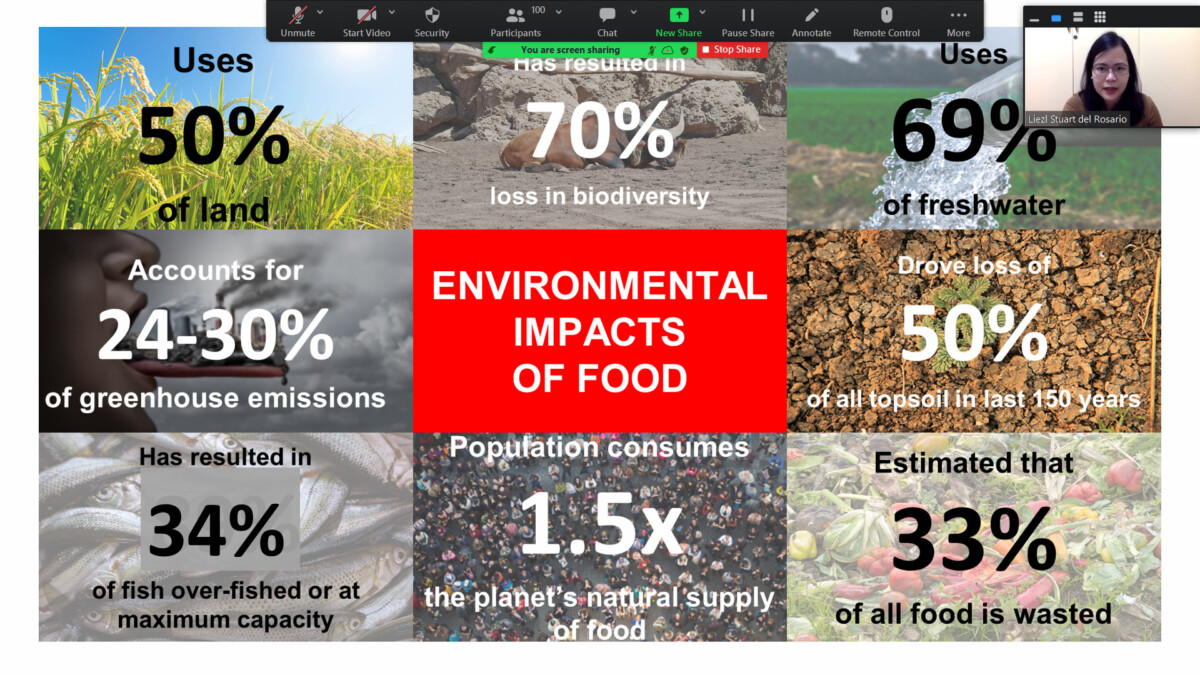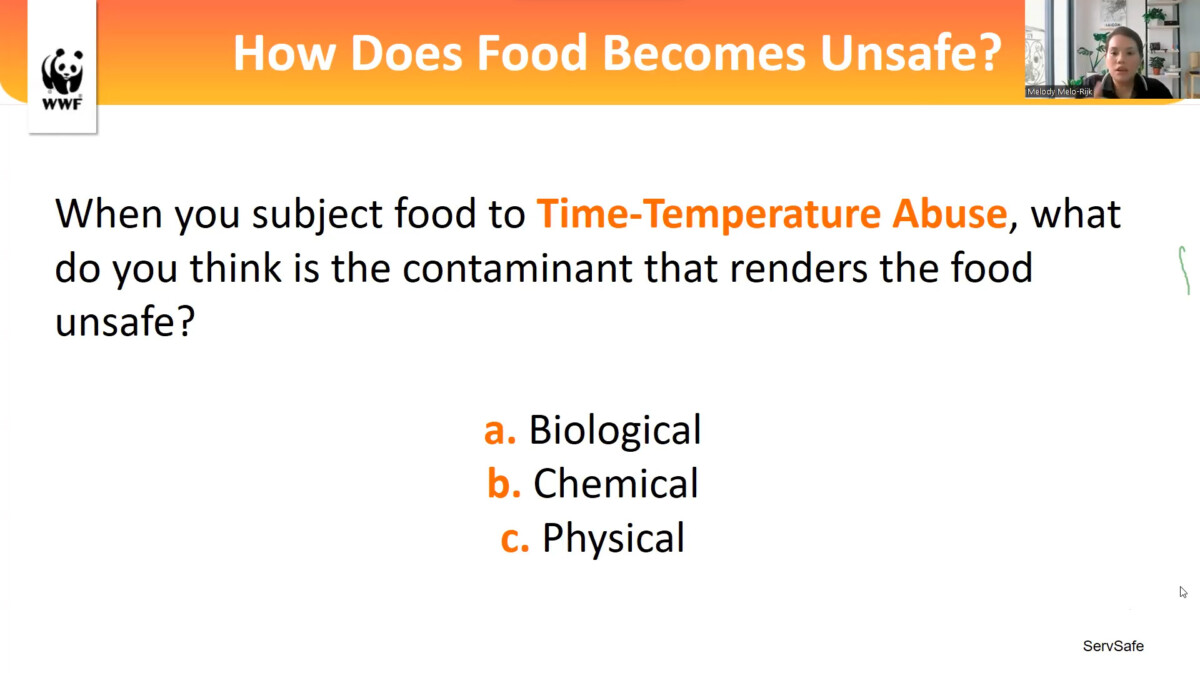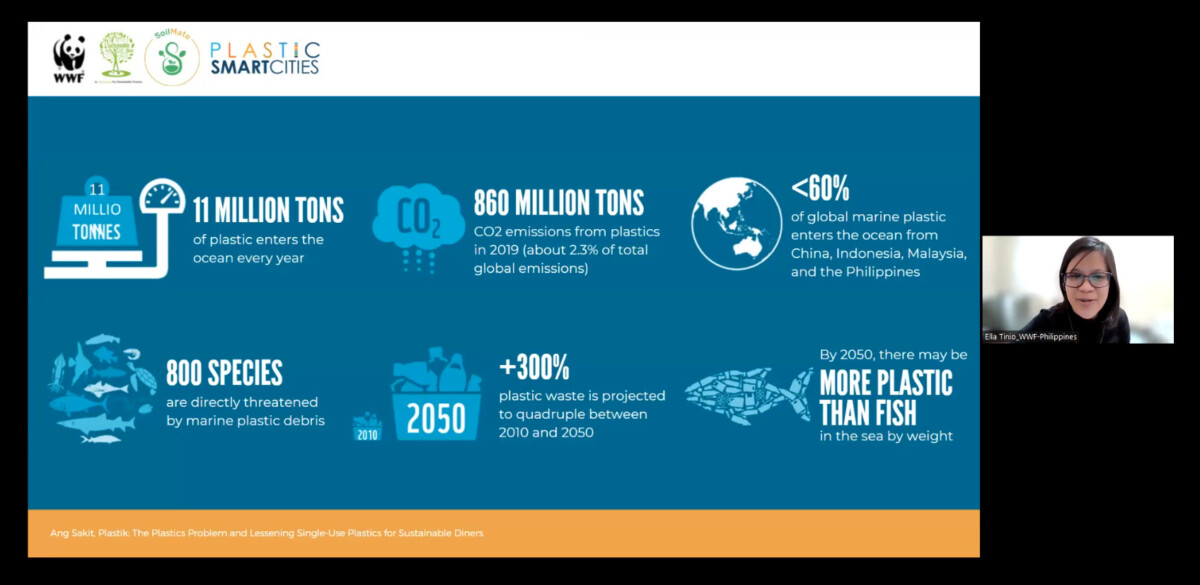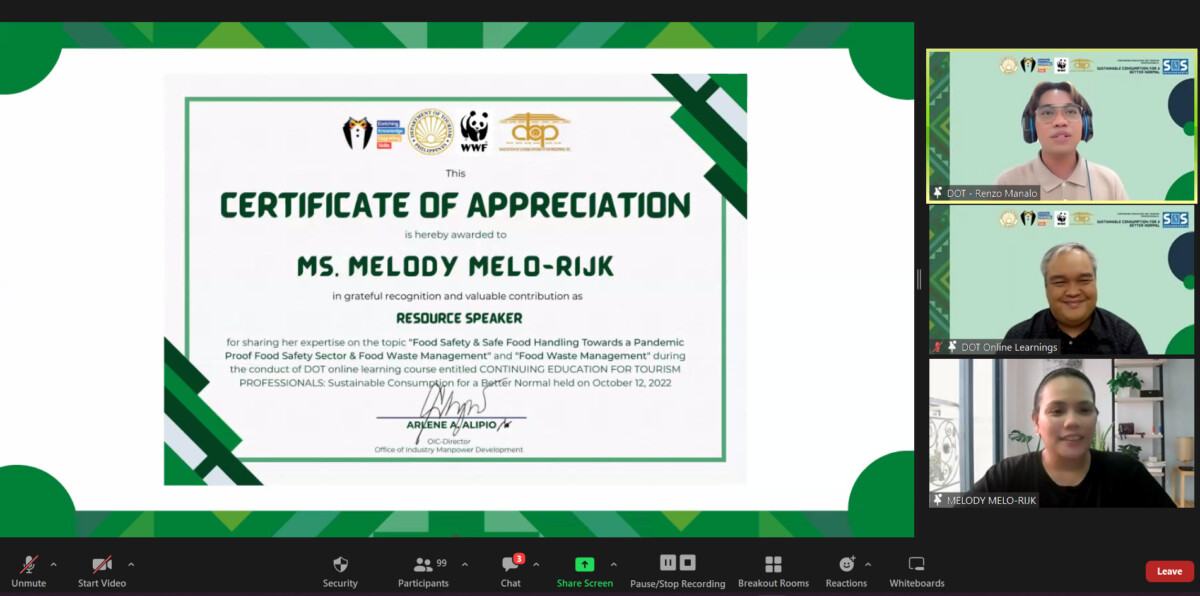A Better Normal and the Journey towards Sustainable Consumption in the Philippine Tourism Sector
As part of the partnership between the World Wide Fund for Nature (WWF) Philippines and the Department of Tourism (DOT), a series of webinars highlighting sustainable industry practices was conducted for the benefit of stakeholders in the tourism sector.
Following the unprecedented effects of the COVID-19 pandemic on virtually all global industries, the Philippine tourism industry suffered devastating consequences as businesses ground to a halt. Now, after more than two (2) years since the start of the pandemic, tourism in the country is slowly reopening, albeit with some hesitance.

WWF-Philippines Policy Manager Liezl Stuart del Rosario discusses the current food crisis and its severe impacts on the planet’s ecosystems and biodiversity.
Sustainable Consumption for a Better Normal: Continuing Education for Tourism Professionals on Sustainable Consumption, a series of webinars implemented by the DoT in partnership with WWF-Philippines aims to impart important lessons in sustainable tourism such as planet-friendly diets, food safety and waste management, and refusal of single-use plastics, all of which aim to contribute to the revitalization of the Philippine tourism industry.
“The tourism landscape has changed,” admitted Janice Maldonado, Supervising Tourism Operations Officer of DOT’s office of Industry Manpower Development, in her opening message. “As borders and businesses slowly open, the industry should be ‘geared towards sustainable tourism’,” she continued. Part of the long-term goals for the Philippine tourism industry hinges on the adherence to Sustainable Tourism Goals and the SDGs that go with it. The industry, Maldonaldo stated, should aim towards achieving these goals by adhering to SDG 6, ‘Clean Water and Sanitation,’ as well as SDG 12, ‘Responsible Consumption and Production.’
From WWF-Philippines, Policy Manager Liezl Stuart del Rosario highlighted the severe impacts of unsustainable consumption and unhealthy diets on our environment. “Our current food systems put an impossible strain on the planet,” said Stuart del Rosario, pointing out the over-reliance of Filipinos on animal-based food products. Compared to vegetables and other fresh produce, meat and animal-derived products are more time and resource intensive. “The current food crisis is responsible for seventy percent of biodiversity loss,” Stuart del Rosario added. “How we produce and consume food is the single best threat to nature.” The Philippines, now ranked as one the fastest growing meat-consuming nations according to the UK-based think tank Chatham House, is a contributor to the skyrocketing number of food waste and plastic pollutants.

WWF-Philippines Project Manager, Food Safety Expert, and Registered Nutritionist-Dietitian Melody Melo-Rijk quizzes the attendees on the food contaminants.
“There is no proper reason for us to waste food,” said Melody Melo-Rijk, WWF-Philippines Project Manager, registered Nutritionist-Dietitian, and food safety expert. From establishing individual task forces and monitoring waste, to tracking waste data and donating excess food, there exists multiple ways to combat food waste. As Project Manager, Melo-Rijk was responsible for leading SoilMate and The Sustainable Diner, two of WWF-Philippines’ food sustainability-focused projects. In SoilMate, special attention was given to the benefits of the Bokashi Composting Method and food waste prevention in the hopes of positively impacting the sustainable food cycle. As a product of the project, the SoilMate App, a mobile application that serves as a platform for easy and convenient composting, can now be downloaded on both Android and iOs. Both SoilMate and The Sustainable Diner were geared towards the elimination of food waste, better health and sustainability standards in the tourism industry, and rectifying the negative impacts of unsustainable packaging and the use of plastics in the hospitality sector.

Maria Louella Tinio, Manila Communications Officer for the WWF initiative Plastic Smart Cities points out the skyrocketing statistics of plastic use in the Philippines and world wide, especially during the pandemic.
With the increase in demand for pre-packed food and food delivery systems, plastic usage both in the Philippines and worldwide had skyrocketed to unprecedented levels. Maria Louella Tinio, Manila Communications Officer for the WWF initiative Plastic Smart Cities, shared insights on the staggering environmental effects of single-use plastics. In Manila, annual plastic usage reached 2,150 tonnes with only 9% of it recycled while 35% was leaked to the environment. As part of the initiative to prevent plastics from entering nature, WWF started the No Plastics in Nature Initiative with the goal of “eliminating unnecessary plastic, doubling reuse, recycling, and recovery, and ensuring that the remaining plastic is sourced responsibly.”
Adapting planet-based diets and sustainable practices in the tourism sector will not only lessen our overall environmental impact, but improve the health and wellbeing of Filipinos. As it stands, Filipinos are not meeting current dietary requirements which adds to the already rising number of obesity, non-communicable diseases, and food-related illnesses that lead to death. While the way we source and prepare food also provides opportunities for health and safety issues to arise.
“Aside from COVID-19, there are a plethora of other foodborne illnesses and areas for contaminants to thrive that we need to avoid,” shared Melo-Rijk. “Preventing contamination in the food chain will reduce foodborne illness and reduce the likelihood of the emergence of novel diseases such as COVID-19.”

A certificate awarding ceremony was conducted near the end of the workshop. The workshop is designed to be a three-part series in order to accommodate as many representatives as possible from the private and public sectors of the hospitality industry. It is part of an ongoing partnership between the Department of Tourism - Office of Industry Manpower Development and WWF-Philippines.
Through the promotion of food that supports biodiversity and the environment, by promoting flexible and balanced diets, and by encouraging businesses to aid in the transition to these healthier practices, Stuart del Rosario assured that “we could tackle all forms of hunger and malnutrition, as well as reduce pressure on the environment.” Furthermore, with proper staff orientation, strict adherence to hygiene and food safety laws, as well as utilization of modern contactless payment methods and food delivery platforms, businesses and the sector as a whole can be more resilient and ready to transition to a post-Covid economy.
“Plastic and food waste problems are not just waste management problems,'' said Chrisma Salao, WWF-Philippines Director for Conservation Programmes, “the most important action is really reducing [waste] from the [tourism] guests.” Salao then reiterated the call for support and cooperation of everyone in the industry in order to achieve sustainable tourism in the new normal and to put into practice the adage “take nothing but photographs, leave nothing but footprints, kill nothing but time.”
About WWF-Philippines:
The World Wide Fund for Nature Philippines is an environmental non-government organization committed to create an impact on biodiversity protection and responding to the climate crisis -towards a safe and just recovery. WWF-Philippines works with a host of partners including national and local governments, to co-create inclusive, innovative, and interdisciplinary solutions that emphasize the role of science in the service of life.
WWF-Philippines' focus is on scaled solutions with our partners to match the enormity of the tasks required to address the urgent environmental challenges facing the present and next generations of Filipinos. Its mission is "to stop, and eventually reverse the accelerating degradation of the Philippine environment – to build a future where Filipinos live in harmony with nature."
For more information, please contact:
Ms. Melody Melo-Rijk
Project Manager, Sustainable Consumption and Production
mmelorijk@wwf.org.ph
Liezl Stuart del Rosario
Policy Manager
lstuartdelrosario@wwf.org.ph
